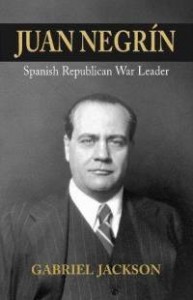Presidential Politics in Republican Spain
 Juan Negrín: Physiologist, Socialist and Republican War Leader. By Gabriel Jackson. Portland, Oregon: Sussex Academic Press 2010. (First published in Spanish in 2009 by Editorial Crítica, Barcelona.) (Buy the book at Powell’s and support ALBA.)
Juan Negrín: Physiologist, Socialist and Republican War Leader. By Gabriel Jackson. Portland, Oregon: Sussex Academic Press 2010. (First published in Spanish in 2009 by Editorial Crítica, Barcelona.) (Buy the book at Powell’s and support ALBA.)
Juan Negrín y López, the “enigmatic” leader of the Spanish Republic from May 1937 until its defeat in March 1939, has not been treated kindly in many histories of the Civil War. Some attacks have been personal, with critics scoffing at his “lavish spending…his delight in pretty women and his gargantuan eating and drinking.” Others have lambasted Negrín’s disorganized work habits and high-handed, dictatorial style. But it is Negrín’s role in the shipping of the Republic’s gold reserve to Moscow and his inability to prevent the persecution and murder of “Trotskyists” by Russian agents operating in Spain that have been particularly seized upon and have led to his denigration as a Communist stooge, a tool of Stalin’s apparent control of the Spanish Republic.
Gabriel Jackson’s new sympathetic biography of Negrín presents a rather different image of the Canarian university physiology professor: a highly intelligent, unassuming, and thoroughly decent man. Jackson recounts details of Negrín’s life before, during, and after the war, his intellectual background, and his personal life. However, though Jackson makes use of considerable previously unseen archival material, details are, on occasion, somewhat vague. As Jackson says, Negrín was a man “with an extremely reserved interior,” and documentary records appear to be almost as elusive as the figure himself. Negrín kept no diary and was not in the habit of saving his correspondence. Many official papers were accidentally destroyed during the war, others afterwards deliberately by his lifelong companion, Feli, acting on Negrín’s personal instructions. The lack of sources means that the early chapters are frustrating, for we learn little about Negrín’s early life, and Jackson is often forced to guesswork. However, when we come to the Second Republic and the war itself, the book is on much firmer ground.
Jackson argues that though the much-derided Negrín was a determined war leader, he was no dictator, but was at heart a moderate socialist and a humanitarian. Like his fellow socialist, rival and one-time friend Prieto, Negrín did what he could to stop the paseos, the murder of imagined enemies of the Republic by “uncontrollables.” He issued passports and wrote personal letters to help political opponents flee Spain, and on one occasion, as Jackson approvingly relates, Negrín slept in a prison in order to limit the blood-letting. And while Negrín himself was secular, he firmly believed in restoring religious freedoms and worked hard to secure the release of imprisoned clerics.
Likewise, Jackson explains how Negrín’s lack of action over the murder of Andreu Nin by the NKVD and the Republic’s brutal suppression of the POUM need to be seen within the context of the Republic’s absolute dependence on Soviet military aid. Russia was the Republic’s only ally, and Negrín knew that meant he must do his utmost not to offend Stalin. This is not to say that Negrín, or Jackson for that matter, condoned the actions of the NKVD in Spain, but that unless Negrín was absolutely sure that the Russian agents were responsible for Nin’s disappearance and presumed murder, he could not afford to rock the boat.
On the infamous sale of the Republican gold reserves to Moscow, Jackson confirms that the impetus came from Spain, rather than from Russia as Negrín’s detractors would have us believe. Jackson tackles head-on the popular notion that the Republic’s war effort was dictated by Stalin, rather than Negrín. To Jackson, Negrín’s determination to maintain his—and Spain’s—independence has been sorely underestimated. Jackson explains why Negrín had such close links with Communists and why Negrín was determined to carry on fighting right to the end, when other senior Republicans such as Azaña, Prieto, and others knew that the game was up.
The answer, of course, was that Negrín and the Spanish Republic didn’t have the luxury of choice. Facing a superior army, boosted by troops from Morocco, Italy, Germany, and Portugal, and deserted by the countries that might have helped, Negrín and the Spanish Republic fought on because Franco would never have accepted a negotiated peace. Negrín was forced to accept whatever help he could get, however tainted and whatever the consequences for Stalin’s fourth internationalist scapegoats. Negrín worked closely with the Communist Party not because he was himself a Communist, or even a fellow traveler, but because they were the most resolute defenders of the Republic. Like them, he was determined to fight on until General Casado’s military coup on March 5, 1939, ended any pretense of continuing resistance.
This bleak reality provides the context for Jackson’s portrayal of Negrín. For Negrín, like the second Spanish Republic, there was no happy ending. Continuing squabbles with Prieto over Republican money ensured that Negrín was effectively sidelined after 1945, and he died of a heart attack in 1956. In this new biography Jackson argues that Negrín was treated unfairly. Some may disagree but, at the very least, Jackson’s study clearly shows that Negrín’s role in the final year of the doomed Spanish Republic has been worthy of reappraisal.
Richard Baxell, a trustee of the International Brigade Memorial Trust, is the author of British Volunteers in the Spanish Civil War.















Can you tell me whether Gabe Jackson is still living? He was our esteemed
English teacher at the Putney School, and many of us became adult friends
of his later.
If living he would now be about 96, but if not it seems that at least one of us
would have heard. Can you give me any information ?
Thank you!